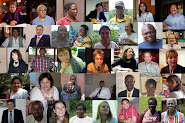 The Center for Creative Leadership has been invited by the Government of Liberia to help develop a global leadership initiative for women in government. The effort is being championed by Ellen Johnson Sirleaf, Africa's first female head of state, and Tarja Halonen, President of Finland. In her two years in office, President Johnson Sirleaf has already enacted a dramatic transformation in Liberia, a country that has seen its share of horror.
The Center for Creative Leadership has been invited by the Government of Liberia to help develop a global leadership initiative for women in government. The effort is being championed by Ellen Johnson Sirleaf, Africa's first female head of state, and Tarja Halonen, President of Finland. In her two years in office, President Johnson Sirleaf has already enacted a dramatic transformation in Liberia, a country that has seen its share of horror.Johnson-Sirleaf has set her presidency as an example of a new kind of leadership. In a speech on leadership at International Institute For Strategic Studies, she stated:
"I pledged to demystify the Presidency, and decentralize the governance system in a spirit of participatory democracy, which will ensure that every segment of our society will become an effective stakeholder, rather than a disinterested bystander, in the running of the country.
"... [a] daunting challenge which our leadership faces in the post- conflict period is getting our war-weary populace to renew their faith and confidence in themselves as a people capable of forging a much better future. This may sound simple, but it is not. In the context of post-conflict leadership, it devolves on us to provide the proper environment that will enable our people to regain their self-confidence. In this regard, we have the responsibility to put in place a governance system based on transparency, accountability, rule of law, and respect for the fundamental human rights of our people, as well as create opportunities for the re-emergence and rekindling of their abundant entrepreneurial skills and aptitudes."
Sirleaf's words are far from empty. The change in Liberia was contrasted by Steve Radelet, a development expert, in the New York Times:
[Before Johnson-Sirleaf] "... the 14-year civil war had killed 270,000 people -- an astonishing one out of every twelve Liberians -- and forced another 250,000 to become refugees. The economy had completely collapsed, with GDP falling by more than 90 percent between 1989 and 1996, one of the largest collapses ever recorded anywhere in the world. Children as young as ten had become pawns in the violence, with warlords abducting them from their families, stuffing them with drugs and arming them with AK-47s."
The situation today is far different, says Radelet, who has been back a dozen times in the past two years:
"Each time I come there are new signs of change: schools and clinics are being reopened, stores are restocked and repainted, the streets are ever more crowded with commercial activity, and electricity and water are being restored (there was no piped water or electricity except generators anywhere in the country for 14 years). Liberia's "control of corruption" index, as measured by the World Bank, registered the second-largest improvement of any country in the world this year."
The change in Liberia is cause for great hope. It signals the dramatic role that leadership can play even in the most fragile of states.



















No comments:
Post a Comment